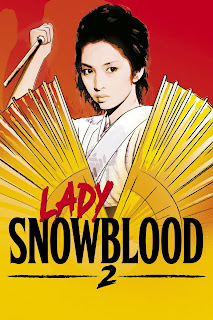Drama/Thriller
1 hour and 29 minutes
Rated: Not Rated
Written by: Kiyohide Ohara & Norio Osada
Directed by: Toshiya Fujita
Produced by: Kikumaru Okuda
Cast:
Meiko Kaji
Yoshio Harada
Juzo Itami
Kazuko Yoshiyuki
Following the enormous success of legendary Japanese filmmaker Akira Kurosawa's samurai movies, such as Yojimbo, Sanjuro, and of course the epic Seven Samurai, Japanese filmmakers began churning out violent samurai films at an enormous rate to the point that these films earned a genre title all of their own: Chambara, a term which essentially translates into the process of adapting the fighting arts into films. Chambara films didn't necessarily have to pertain to swordplay, but again, largely following the success of Kurosawa's films, most of them did.
In 1973, Korean born filmmaker Toshiya Fujita released his masterpiece of cinematic, blood-soaked vengeance, Lady Snowblood, which performed enormously well throughout the world (better than most would expect a Japanese exploitation film would perform, anyway). The story was based on a popular manga and showcased an iconic performance by Japanese actress/singer Meiko Kaji as the titular figure. The story's simplistic plot of revenge, its enormously bloody sword fights, and of course its stunning cinematography all helped in its becoming an iconic piece of exploitation cinema. Perhaps it isn't that surprising then, given its success, that Fujita decided to follow up Lady Snowblood with a sequel in as little time as possible, in order to exploit and build upon the success of the first film.
Thus, Lady Snowblood 2: Love Song of Vengeance was born. Like with its predecessor, Fujita chose to utilize the already written manga again for inspiration regarding the story's sequel. This would prove perhaps to be an inconsequential decision for multiple reasons. The first Lady Snowblood was a straightforward revenge story, that's biggest strength was its plot's simplicity. While it undeniably had undertones of a political nature, none of those sentiments boiled up enough to permeate through the surface layers of the film, and merely helped to serve with the backdrop of turn of the century Japan that the film was set against. In Lady Snowblood 2, however, politics have taken over completely, and serve as the main catalyst to the film's "vengeance" that follows. Whereas in the first film, audiences saw violent acts of rape and murder springing revenge into action, in the sequel, Meiko's titular hero doesn't become inspired by vengeance until the violent politics of the era have caused those whom she cares about, or rather those she owes her life to, to be killed or hurt in some horrific and violent manner. Meiko's hero Yuki, in fact, at first joins forces with a self-proclaimed anarchist in order to attack the very corrupt government officials who freed her from the gallows. While perhaps this all made sense in the manga source material, over the course of the two films it seems completely preposterous. Yuki is a revenge driven figure in the first film with no affiliations to anyone but those whom she had loved - her family. Her desire to join forces with someone for their political motivations, no matter how just they are framed to be in the context of the story, seem totally out of character for her.
Equally uninspiring are the film's technical qualities. The first Lady Snowblood had brilliant cinematography that captured its violent sequences in an absolutely stunning and gorgeous manner. Sword fights played out like beautiful operas, with the crimson fountains of over exaggerated wounds spewing blood across white snowy surfaces and the walls of beautiful palaces. Here, in the sequel, cinematographer Tatsuo Suzuki, who did not photograph the first film, does nothing to replicate this. In fact, much of the sword fights in Lady Snowblood 2 feel dull in nature. They lack the blood and mayhem of the original just as much as they do the beauty. And as this is a politically driven plot, the sword fights feel few and far between. The film's final showdown does reach a closeness to the quality of the original film's, but it still falls short in the grand scope of things. The film's soundtrack by composer Kenjiro Hirose feels bizarre and again, completely different from what was in the first film. Perhaps the music would have been better suited for a spaghetti western, for there are moments that feel very Ennio Morricone-esque in nature.
Besides all of its problems, Lady Snowblood 2 does manage to maintain some captivating and engaging moments. As previously stated, the film's final showdown is a worthy conclusion and is absolutely brilliant in execution. The gore effects are astounding, especially in two particularly nasty moments of eye-gouging that will make all gore-hounds and exploitation fans cheer with joy, and would undeniably bring a tear of happiness to the eye of someone like Lucio Fulci - the king of eyeball torture in cinema. Meiko Kaji is terrific as the film's hero again, and it is perhaps all too unfortunate this badass woman of cinema isn't as world renowned as she ought to be. The other performers are equally engaging, with the film's capitalist-driven villains being the most entertaining to watch perform.
While Lady Snowblood 2: Love Song of Vengeance can't manage to live up to the amazing qualities of its predecessor, it still remains a fun chambara film with enough engaging qualities that it will undeniably give those who adore this kind of film an overall sense of satisfaction with the end product. It fails in ambition, it fails in beauty, and it fails in grasping onto the knowledge of what made the first film so brilliant - but nevertheless, you'll still have a blood-soaked good time with the end product.
6.5/10

No comments:
Post a Comment